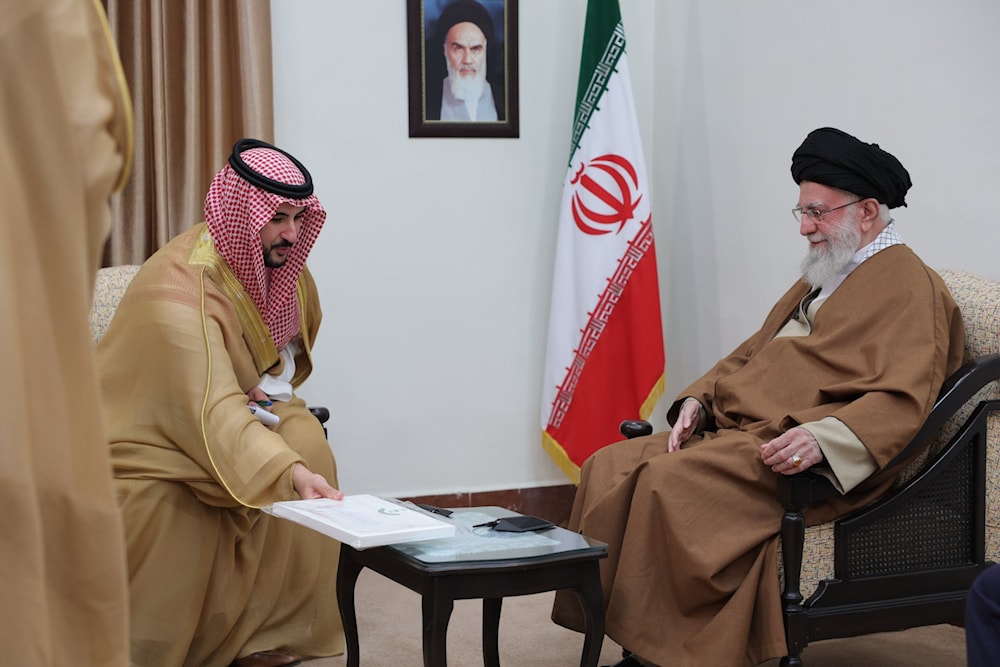Iran-Saudi ties to 'benefit both nations,' says Sayyed Khamenei
"It is far better for brothers to help each other than to rely on outsiders," Sayyed Khamanei said.
-

Saudi Defense Minister Khalid bin Salman Al Saud (left) delivers a message from the King of Saudi Arabia to Ayatollah Khamenei on April 17, 2025 (IRNA)
IRNA on Thursday reported that Iran's leader, Ayatollah Sayyed Ali Khamenei, welcomed Saudi Arabia's Defense Minister Prince Khalid bin Salman Al Saud in Tehran, where the two discussed prospects for deeper bilateral ties. The visit, which marked a significant diplomatic gesture, included the delivery of a message from Saudi King Salman bin Abdulaziz Al Saud to Ayatollah Khamenei.
During the meeting, Ayatollah Khamenei noted that stronger relations between Iran and Saudi Arabia would serve the interests of both countries. "The relations between Iran and Saudi Arabia will benefit both nations and... the two countries can complement each other," he stated.
Acknowledging the challenges facing the improvement of Tehran-Riyadh ties, the Iranian leader affirmed the need to push past hostile agendas. "The enhancement of ties between Tehran and Riyadh faces opposition," he said, adding, "hostile intentions must be overcome," and affirming that "Iran is fully prepared to do so."
He also referenced Iran's technological and military advancements, expressing readiness to support Saudi Arabia in these areas, and called for mutual reliance between neighboring states rather than dependence on external powers. "It is far better for brothers to help each other than to rely on outsiders," he remarked.
Prince Khalid, who led a high-ranking delegation of military officials, affirmed the Kingdom's commitment to expanding cooperation with Iran. "I am in Tehran with the intention to expand relations and cooperation with Iran across all areas," he said, voicing optimism that the exchange would lead to meaningful progress. "I hope the constructive discussions will lead to stronger ties between Saudi Arabia and the Islamic Republic of Iran."
Diplomatic Shift
The meeting comes amid shifting regional dynamics, particularly as US President Donald Trump, during a recent meeting with Israeli Prime Minister Benjamin Netanyahu, reportedly announced the launch of backchannel talks with Iran toward a new nuclear agreement, without involving Tel Aviv. According to The Jerusalem Post, the move left Netanyahu blindsided and visibly unsettled, as his visit to Washington had focused on easing trade tariffs and discussing joint strategies against Iran's nuclear program.
Adding to "Israel's" unease, Trump also revealed his intent to move forward with a US-Saudi civilian nuclear cooperation deal that does not require normalization with "Israel"—a significant departure from prior US policy under Biden that had tied any such agreement to diplomatic recognition of Israel by Riyadh. Netanyahu was said to have received a "harsh and even somewhat humiliating" response from Trump, according to Yedioth Ahronoth, and left Washington without any concrete commitments on tariff relief or Gaza policy.
Read more: US, Saudi Arabia in talks on nuclear tech deal, says US energy sec.
These developments highlight the growing divergence between Tel Aviv's objectives and those of Riyadh and Washington. The Saudi leadership has made it clear that any normalization with "Israel" is conditional on the establishment of a Palestinian state—a stance hardened since "Israel's" genocidal campaign in Gaza began in October 2023.
Despite these tensions, the Iran-Saudi rapprochement continues to progress. Since the restoration of diplomatic ties in March 2023 through a China-brokered agreement, embassies have reopened and dialogue has advanced across economic, political, and security fronts.
The Saudi minister also held talks with Major General Mohammad Baqeri, Chief of Staff of Iran's Armed Forces, and other senior military and political officials during his one-day visit.

 4 Min Read
4 Min Read










